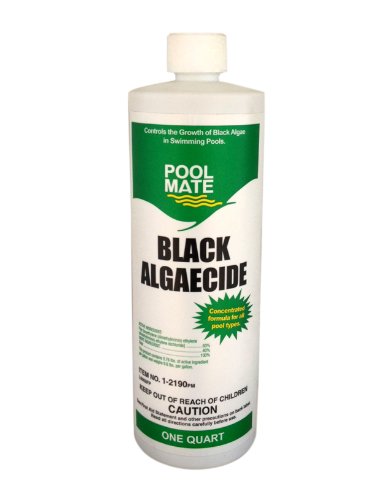What To Do With Black Algae In A Pool
Affiliate Disclosure: We receive a commission for purchases made via affiliate links.
If you have black algae in your pool, you need to get rid of it as soon as possible because swimming in a pool with black algae is unsafe. Even the best pool vacuum won’t get rid of stubborn black algae that has been left to grow.
Black Algae
Why Does Your Pool Have Black Algae?
One of the most common reasons you may find black algae in your pool is because someone might have gone swimming in a lake, river, pond or ocean and did not wash their swimwear before jumping in your pool.
So remember, the next time you go floating down a river with your goggles and tube, make sure you wash off all your gear before putting it into your swimming pool.
Another way black algae can land in your pool is through airborne spores, but this is more unlikely.
What Does Black Algae Look Like?
If you know what you’re looking for, it makes it easier to eradicate the black algae when it’s still manageable.
Keep your eye out for black, blue or green spots that are bumpy and rough patches that look like mold on the walls and floors of your pool. Black algae doesn’t usually float in water.
The posts are about the size of a quarter and have a hard shell protecting the cells within them.
If you can brush it off quickly, you can be assured it’s not black algae.
Black algae does not usually grow in fiberglass pools or ones with vinyl liners.
What is Black Algae?
Algae, an aquatic plant, is usually green because green algae contains chlorophyll, which allows plants to perform photosynthesis, a natural occurrence where plants use light to synthesize food from carbon dioxide and water.
Black algae is a cyanobacterium containing chlorophyll and other water-soluble pigments to make the bacteria appear black.
Black algae is a highly stubborn form of algae that is difficult to kill.
They are single-cell organisms that flourish in colonies and can be resistant to chlorine.
Pools with porous surfaces like concrete, aggregate, and gunite are more likely to have a black algae problem.
Is Black Algae Harmful?
Cyanobacteria flourishes can kill other organisms that live in lakes and ponds by blocking sunlight and sucking up the oxygen.
Cyanobacteria can also create cyanotoxins, a potent poison that can make people and pets ill.
So, yes, swimming in water with black algae can make you sick, especially if you accidentally swallow some water.
Symptoms of ingesting black algae include stomach cramps and nausea. In extreme cases, swallowing black algae can cause liver damage, especially in older dogs or babies.
How do I Get Rid of Black Algae?
There are several products you can use to get rid of black algae.
1- McGrayal Algatec 10064 Super Algaecide
McGrayal Algatec 10064 Super Algaecide kills most algae types within eight to 24 hours, but because black algae is super resistant, this product can take between seven and 10 days to work.
The algaecide doesn’t alter the pool water’s pH level, and you can swim almost immediately after treating your pool.
The way it works is it kills the algae outright instead of starving it, the product has biostatic inhibitors that prevent regrowth.
McGrayal Algatec works on salt pools, is compatible with chlorine and does not contact bromides or metals.
2- Applied Biochemists 406303A Black Algaetrine Swimming Pool Algaecide
Applied Biochemists 406303A Black Algaetrine is specially formulated to eradicate the most stubborn black algae and can be used as part of your pool maintenance cycle.
It works on a variety of pool surfaces and kills deep-rooted cells quickly as well as serves as a growth prevention agent.
There’s no waiting time after using it, and you can swim immediately after.
3- Pool Mate 1-2190 Black Algaecide
Pool Mate 1-2190 Black Algaecide is a non-metallic algaecide for black algae and is suitable for gunite, concrete, fiberglass and vinyl pools.
The product is non-foaming, and both kills as well as prevents black algae.
To clean the black algae from the walls of your pool, you need a firm pool brush with rigid stainless steel.
Tips on how to keep black algae away from your pool
#1- Sanitize
If any of your family members have had a dip in a lake, river or pond, make sure they wash their swimsuits, floating devices and toys before jumping in the pool.
Hand washing may not be good enough, so make sure your swimming costumes are machine washed in hot water.
Floats, armbands and toys should be bleached.
#2- Monitor Pool Water
Make sure the water in your pool is at the correct pH levels between 7.4 and 7.6.
The alkalinity should be between 120 and 150 parts per million to ensure the chlorine is working efficiently.
You can test these measurements yourself using a pool test kit.
If you have a saltwater pool, read this post about saltwater pool maintenance.
#3- Scrub the Surface
Scrub the surfaces of your pool well, as black algae can be difficult to remove.
Brush thoroughly for as long as you can using a stainless steel brush designed to remove algae.
Also read:
- How To Vacuum A Pool
- Saltwater Pools vs Chlorine
- Best Pool Pumps
- Best Pool Vacuum Guide
- How To Maintain A Saltwater Pool
- Pool Water Testing Tips
- Zodiac Pool Vacuums Explained
- How To Get Rid Of Black Algae
- Best Pool Vacuum For Algae
- Best Pool Vacuum For Leaves
- Best Robotic Pool Cleaners For All Budgets
Categorised in: Swimming Pool Maintenance







